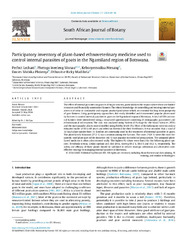Participatory inventory of plant-based ethnoveterinary medicine used to control internal parasites of goats in the Ngamiland region of Botswana.
Date
2024-08Author
Lechani, Perfect
Monau, Phetogo Ineeleng
Ntesang, Kebonyemodisa
Pfukenyi, Davies Mubika
Madibela, Othusitse Ricky
Metadata
Show full item recordAbstract
The effect of internal parasites on goats is of major concern, particularly in the tropics where there are limited resources and financially constrained farmers. The ethnic knowledge on controlling and treating internal parasites is of value to sustainable and organic product production which are essential for long-term prosperity of goat farmers. Using participatory approaches, this study identified and documented popular plants used by farmers to control internal parasites in goats in the Ngamiland region of Botswana. A total of 120 communal farmers were interviewed using a structured questionnaire consisting of demographic parameters and ethnobotanical information. The data was analysed using Statistical Package for the Social Sciences (SPSS) and the most popular plants were identified using fidelity levels (FL). Most of the informants were secondary educated males of 50 to 60 years and relied on livestock for their livelihoods. It was recorded that a total of 13 local plant species from 11 families are commonly used in the treatment of intestinal parasites in goats. The plant family Fabaceae (27.3 %) was common among the farmers. The roots (76.9 %) were the most frequently used plant part while decoction (46 %) was popular in medicinal preparations. The prepared plant-based medicine is often administered orally. The highest FL values were found for the following plant species; Terminalia sericea, Gnidia capitata and Aloe ferox, scoring 89.3 %, 88.0 % and 86.3 %, respectively. The safety and efficacy of these plants should be validated to inform strategic utilization and alternative cost-effective strategy in managing internal parasites in Botswana.
URI
10.1016/j.sajb.2024.05.043https://www.journals.elsevier.com/south-african-journal-of-botany
https://hdl.handle.net/13049/743
Collections
- Research articles [174]

